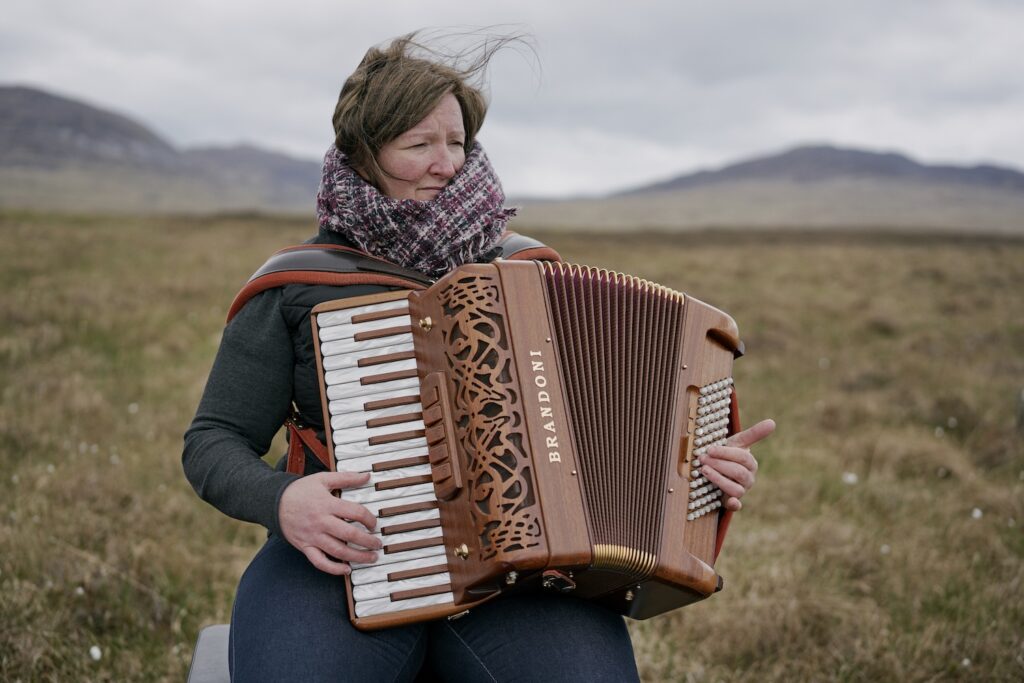
Born in Oban and raised just a stone’s throw away in Connel, Argyll, Sileas Sinclair’s life has been steeped in the rich tapestry of West Coast ceilidh music, Gaelic song, and Highland dancing from her earliest days. With a father who was an accordion player, pianist, and conductor of the Oban Gaelic choir, a mother who taught Highland dancing and played piano, and grandparents who sang in the choir, Sinclair was, as she puts it, “lucky to be born into” this vibrant cultural milieu.
The Sinclair household was a hub of traditional music. The sounds of live music was constantly there and there were often accordion classes taking place regularly in the house. Young Sileas cut her teeth dancing, singing, and playing at local ceilidhs, while her Gaelic-speaking grandmother ensured that the language’s rich musical heritage was passed down through song.
As a teenager, Sinclair’s musical tastes expanded to include bands like Wolfstone and Runrig, with her first big live concert experience being a Wolfstone performance at Eden Court. However, her musical appetite was far from limited to traditional fare. The 80s pop scene, with acts like Wet Wet Wet and A-ha, also caught her ear, as did classical music and musical theatre, influences from both sides of her family.
Sinclair has observed significant changes in the traditional music scene over the past two decades, particularly in the West Coast ceilidh scene where she has been most active. The style of bands playing for dancing has evolved, with less emphasis on traditional ‘dance bands’ and more crossover with the folk world in terms of accompaniment styles and tune selection. However, she notes with satisfaction that the strong Gaelic influence remains a constant, alongside popular country and Irish music influences.
For Sinclair, the joy of working in Scottish music and culture lies in the people and the friendships forged through both teaching and performing. She revels in the “good craic and banter” and the ease with which connections are made across generations through a shared love of music and culture. The interplay between music, culture, and language fascinates her, as does the way tradition evolves while remaining relevant to current generations
Currently, Sinclair finds herself deeply involved in teaching group work to teenagers at various stages of their musical journey. From the Fèis Latharna Sunday Sessions for beginners to the more advanced Oban High School Traditional School of Music and the Fèis Ceilidh Trail Project, she takes pride in guiding young musicians from their early teens through to their early twenties.
Looking to the future, Sinclair hopes to strike a balance between her teaching and performing commitments. She has plans for more performance projects, believing that pushing her own boundaries as a musician will, in turn, inspire her pupils. Her work with the Oban Gaelic Choir remains a great love, and she harbours ambitions to develop her arranging skills, taking them from choral arrangements to larger instrumental works.
Sinclair is quick to acknowledge the many fantastic teachers in the field, all working to pass on their love of music, tradition, and culture to the next generation. She sees her work not just as a way to make a living, but as a privilege, and is deeply grateful for the opportunity to work in a field she loves so passionately.
As she reflects on receiving recognition for her work, Sinclair remains characteristically humble, emphasising that her achievements are very much shared with the “best musicians, teachers, organisers and people” she knows. Her gratitude extends to those organising fèisean, local and National mòds, and other community music groups and cultural festivals, without whose hard work and effort much of what she does would not be possible.
In Sileas Sinclair, the traditional music scene of Argyll has found a dedicated guardian and innovator, committed to keeping the culture “alive and kicking” in local communities while nurturing the next generation of musicians.